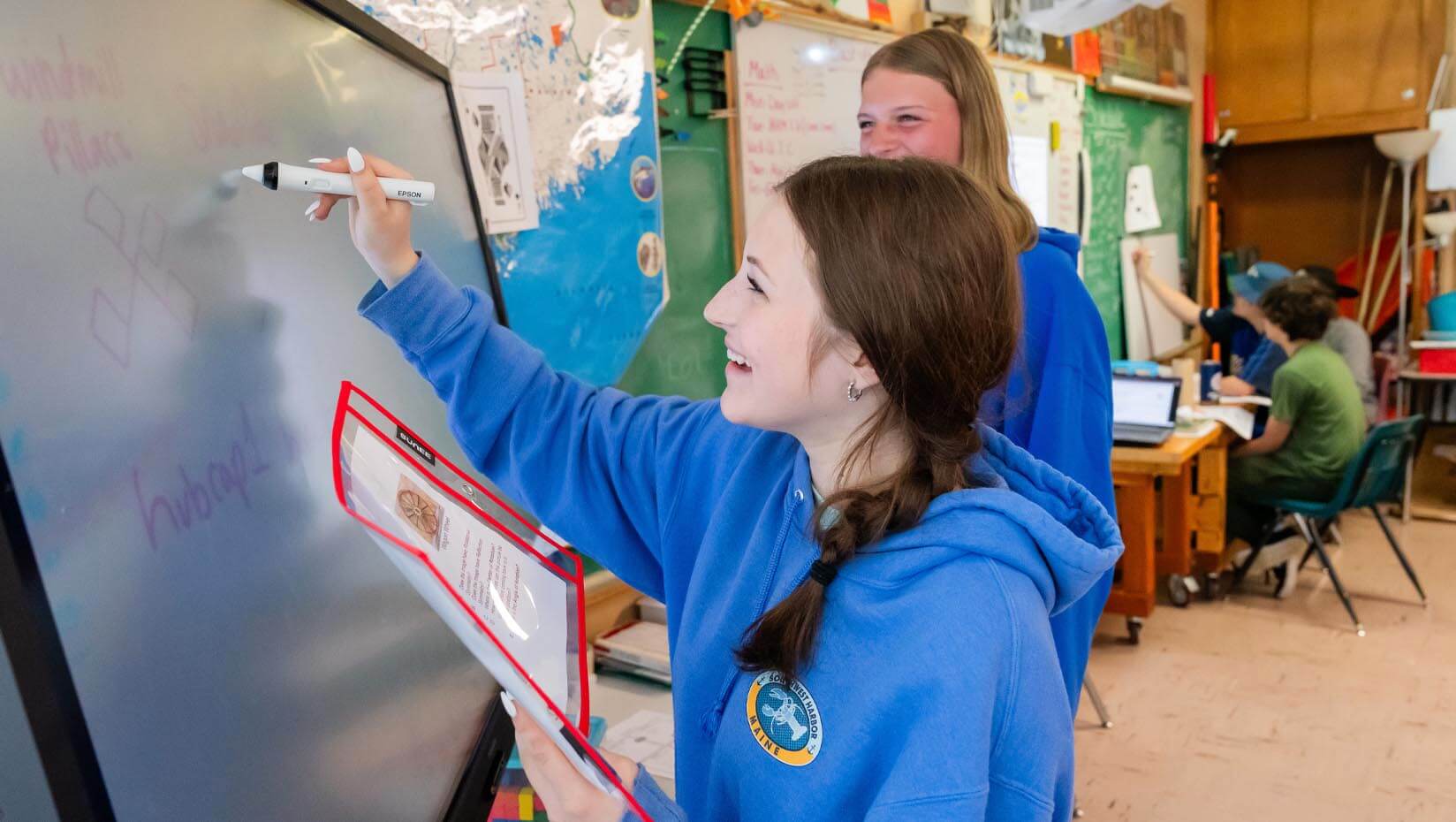
Math teachers enhance instruction with support from UMaine’s RiSE Center
Derek Bizier doesn’t teach his eighth grade math students the same way he learned in middle school — primarily through lectures. Instead, his students at Leonard Middle School in Old Town spend most of class out of their seats solving problems in small groups on large vertical whiteboards throughout the classroom.
The questions students answer reinforce new mathematical concepts that Bizier teaches them. They are few but complex, broken down into several parts so they can be solved one step at a time, making them less daunting and easier to grasp.
Bizier walks between groups as they discuss the work and scribble notes, answering questions and offering assistance only when necessary. The students also visit different groups to seek or offer assistance.
“They might be asking another student, or I may even ask a student, ‘Hey, you guys are really far ahead, can you go help this group real quick and get them on the right track?’ And I find that when I can do that, the students seem to learn and work even harder, because they’re learning from their peers,” Bizier said.
Bizier is one of many elementary, middle and high school teachers at Regional School Unit (RSU) 34 in Old Town, RSU 26 in Orono and RSU 67 in Lincoln who is adopting new methods of teaching with support from Jennifer Fronczak with the Maine Center for Research on STEM Education (RiSE Center). With these new practices, teachers hope to enhance their students’ critical thinking and problem-solving skills.
The University of Maine’s RiSE Center hired Fronczak, a professional learning specialist, two years ago to offer math instruction support for teachers and administration. Fronczak has provided direct aid to educators in their classrooms and worked with them on updating their instruction methods. She also has taught them new strategies through book studies, workshops and conferences, and evaluated their impact on students following implementation.
“The collaboration between the RiSE Center as a research practice partnership with the area schools is a new and innovative idea that has brought a great deal of benefits to all involved,” Fronczak said.
The teaching practices Fronczak has taught derive from the book “Building Thinking Classrooms in Mathematics, Grades K-12: 14 Teaching Practices for Enhancing Learning,” by Peter Liljedahl. Teachers select which strategies from the book best complement their curricula, and Fronczak helps with implementation.
“What’s nice about this is they don’t have to buy a new program. It’s just practices that they can change in their own classroom,” Fronczak said.
To help students grasp new mathematical concepts and how they relate to others, the students sometimes tackle problems with multiple solutions. For example, rather than answering how much five nickels add up to, elementary students may be asked how to obtain 20 cents — whether that be by combining two dimes, four nickels, 20 pennies or other combinations of coins.
“In our traditional classroom, the teacher shows you how to do it. You do it the way the teacher thought, and maybe sometimes you’re thinking, ‘Well, I think about that a little differently,’” Fronczak said. In this new approach, however, “the teacher proposes the problem and you come about it however it makes sense to you. They’re not a purveyor of all knowledge.”
After group work, Bizier has his students select and tackle workbook questions — as many as they need to solve in order to grasp the concept. Bizier also provides guided note sheets that encourage students to be more selective with what they write down to support their own learning, as opposed to recording everything he says during a lesson.
“I applaud these mathematics teachers for adopting innovative, research based practices to empower their students, as well as Jennifer and RiSE Center staff who leverage their expertise to bolster K-12 learning in Maine,” said UMaine President Joan Ferrini-Mundy, who is also a RiSE Center faculty member with a background in mathematics education. “These students are at a critical time for developing strong reasoning and problem solving skills and, hopefully, an interest in STEM. With support from the RiSE Center, I’m confident that these teachers’ engaging instruction will foster a lifelong passion for mathematics among many of their students.”
Fronczak will assess the effectiveness of these strategies through an attitude survey involving students and teachers.
Bizier said he has enjoyed his students becoming more excited about learning and has seen more smiles and high-fives among them. As a newer teacher, he said working with fellow math teachers at RSU 34 and Fronczak has been beneficial for improving his instruction and for professional development.
“Being able to sit back and see these kids be engaged in a subject that they hated before they came to me makes me feel very, very accomplished, but it also makes me very hopeful for my students, and that is why I got into teaching,” he said. “For them to be able to step back and say, ‘Yeah, yeah, I can do this math stuff!’ is huge.”
Contact: Marcus Wolf, 207.581.3721; marcus.wolf@maine.edu
